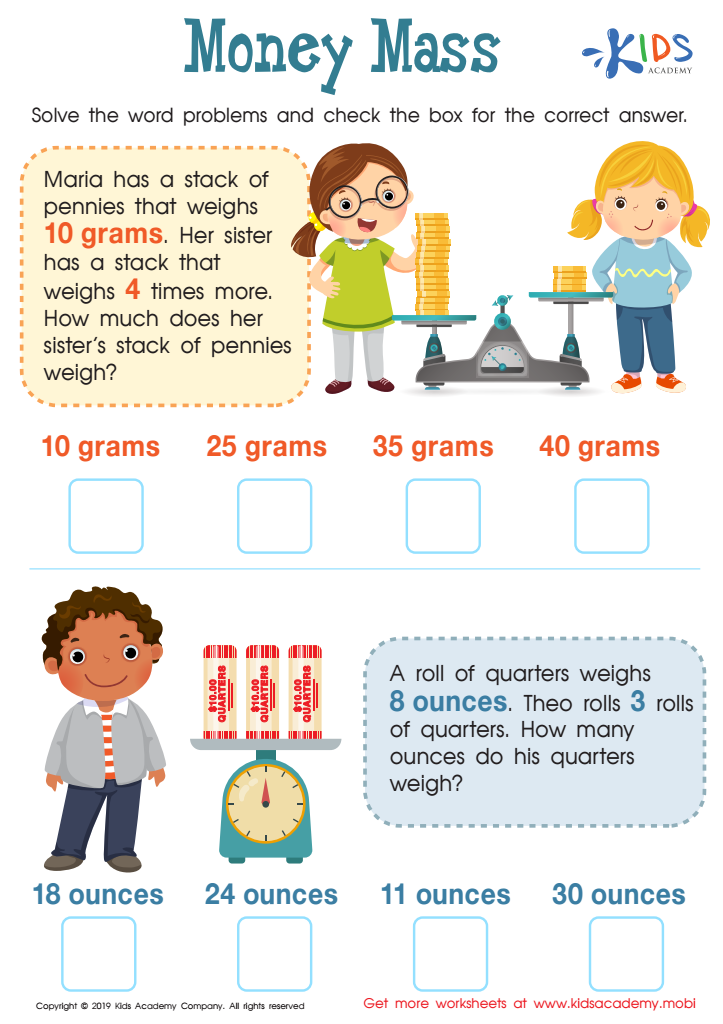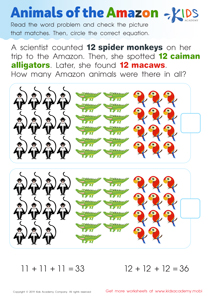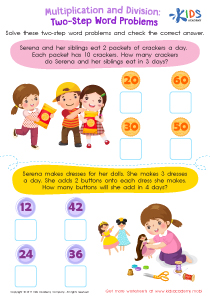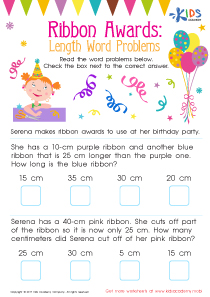Extra Challenge Money Word Problems Worksheets for Ages 3-5
1 filtered results
-
From - To
Introduce your little learners to the exciting world of math with our Extra Challenge Money Word Problems worksheets, specially designed for children aged 3-5 years. These educational online worksheets blend fun and learning to help young minds grasp basic financial concepts through engaging and age-appropriate challenges. Crafted by educational experts, our carefully structured activities ensure a stimulating experience that enhances counting skills and early arithmetic understanding. Perfect for home or classroom use, these worksheets provide a solid foundation for future mathematical success. Start your child's journey into the world of money management today with our interactive and educational sheets!


Money Mass Worksheet
Extra Challenge worksheets on Money Word Problems are an invaluable resource for early childhood education, particularly beneficial for children aged 3 to 5 years. These educational online printables not only introduce young learners to basic mathematical concepts but also weave in practical life skills involving money management. Let's explore why these worksheets are pivotal in laying a strong educational foundation for young minds.
Firstly, Extra Challenge worksheets serve as an engaging tool to teach children about numbers and calculations in a context they can see themselves using in the future. At the tender ages of 3 to 5, children are naturally curious about the world around them, including the exchanges they see involving money. By incorporating money word problems into educational online printables, we can tap into this curiosity, making learning both fun and relevant.
Moreover, money word problems help in developing critical thinking and problem-solving skills. These worksheets challenge children to apply their numerical knowledge in practical scenarios—calculating simple additions or subtractions based on money, for example. This not only reinforces their arithmetic skills but also encourages them to think logically and critically about everyday situations.
In addition, the use of educational online printables for teaching money word problems ensures accessibility and ease of use. Parents and educators can easily download and print these resources, making the setup for learning activities straightforward and hassle-free. This accessibility is crucial, especially in today’s rapidly shifting educational landscape, where learning resources need to be readily available in various formats.
Furthermore, incorporating money concepts through worksheets can also instill early financial literacy skills. Understanding money's value, the basics of buying and selling, and the concept of saving are all fundamental financial principles. Introducing these concepts early through practical examples in worksheets helps children understand and appreciate the importance of money management from a young age.
The design of these worksheets also plays a crucial role in their effectiveness. Extra Challenge worksheets are typically crafted with vibrant colors, engaging characters, and interactive elements that attract young learners. This visual and interactive approach is particularly effective for children in the 3-5 year age group, as it holds their attention and enhances their learning experience. The worksheets are not just about solving problems; they are about learning through play, which is an essential aspect of early childhood education.
Moreover, these worksheets are designed to cater to various learning paces and styles. Every child is unique, and their learning needs differ. Extra Challenge worksheets on Money Word Problems often come in different levels of difficulty, ensuring that all children, regardless of their learning stage, can benefit from them. This adaptability makes it possible for educators and parents to tailor the learning experience to the child's specific developmental level, promoting a more personalized learning journey.
The interactive nature of these educational online printables also encourages parent-child interaction, which is crucial at this developmental stage. Engaging in worksheet activities together allows parents to observe and understand their child’s strengths and areas needing improvement, fostering a nurturing learning environment. This active involvement can enhance the child’s learning outcomes, as they receive immediate feedback and encouragement, reinforcing the learning concepts and their applications.
Furthermore, the use of money word problems in these worksheets supports other areas of development beyond math. For instance, reading the problems helps improve language skills, while discussing them can enhance communication abilities. These interdisciplinary benefits show how well-rounded these educational tools are, contributing to a holistic approach to early childhood education.
In conclusion, Extra Challenge worksheets on Money Word Problems are more than just educational tools; they are integral building blocks for young learners. They not only teach vital mathematical skills but also introduce important life skills such as financial literacy and critical thinking. The design and accessibility of these educational online printables ensure that they are an effective and enjoyable part of early learning curriculums, tailoring educational experiences to individual needs and making learning an engaging, interactive, and fruitful journey for children aged 3 to 5 years. By fostering these skills early on, we pave the way for more aware, confident, and independent individuals in the future.
 Assign to the classroom
Assign to the classroom









